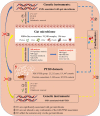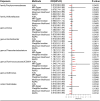Potential causal association between gut microbiome and posttraumatic stress disorder
- PMID: 38296956
- PMCID: PMC10831060
- DOI: 10.1038/s41398-024-02765-7
Potential causal association between gut microbiome and posttraumatic stress disorder
Erratum in
-
Correction: Potential causal association between gut microbiome and posttraumatic stress disorder.Transl Psychiatry. 2025 Sep 30;15(1):347. doi: 10.1038/s41398-025-03628-5. Transl Psychiatry. 2025. PMID: 41027891 Free PMC article. No abstract available.
Abstract
Background: The causal effects of gut microbiome and the development of posttraumatic stress disorder (PTSD) are still unknown. This study aimed to clarify their potential causal association using mendelian randomization (MR).
Methods: The summary-level statistics for gut microbiome were retrieved from a genome-wide association study (GWAS) of the MiBioGen consortium. As to PTSD, the Freeze 2 datasets were originated from the Psychiatric Genomics Consortium Posttraumatic Stress Disorder Working Group (PGC-PTSD), and the replicated datasets were obtained from FinnGen consortium. Single nucleotide polymorphisms meeting MR assumptions were selected as instrumental variables. The inverse variance weighting (IVW) method was employed as the main approach, supplemented by sensitivity analyses to evaluate potential pleiotropy and heterogeneity and ensure the robustness of the MR results. We also performed reverse MR analyses to explore PTSD's causal effects on the relative abundances of specific features of the gut microbiome.
Results: In Freeze 2 datasets from PGC-PTSD, eight bacterial traits revealed a potential causal association between gut microbiome and PTSD (IVW, all P < 0.05). In addition, Genus.Dorea and genus.Sellimonas were replicated in FinnGen datasets, in which eight bacterial traits revealed a potential causal association between gut microbiome and the occurrence of PTSD. The heterogeneity and pleiotropy analyses further supported the robustness of the IVW findings, providing additional evidence for their reliability.
Conclusion: Our study provides the potential causal impact of gut microbiomes on the development of PTSD, shedding new light on the understanding of the dysfunctional gut-brain axis in this disorder. Our findings present novel evidence and call for investigations to confirm the association between their links, as well as to illuminate the underlying mechanisms.
© 2024. The Author(s).
Conflict of interest statement
All authors declare that the research was conducted in the absence of any commercial or financial relationships that could be construed as a potential conflict of interest.
Figures






References
-
- Diagnostic and statistical manual of mental disorders: Dsm-5™, 5th ed. Arlington, VA, US: American Psychiatric Publishing, Inc.; 2013.
MeSH terms
LinkOut - more resources
Full Text Sources
Medical
Research Materials
Miscellaneous

